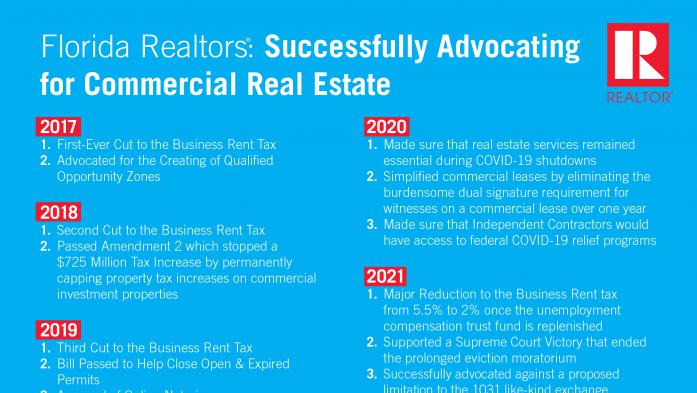
Florida Realtors PAC: Protecting Commercial Interests in the State
Florida Realtors® and Florida Realtors PAC have been long-standing champions of the commercial real estate industry, especially when it comes to our advocacy efforts within state government.
Florida Realtors: Successfully Advocating for Commercial Real Estate
Our legislative victories on behalf of commercial Realtors have been numerous over the years, with our most recent victories doing much to help strengthen the market, make commercial leases more affordable and ease some of the bureaucracy standing in the way of commercial deals.
The following is a brief recap of some of our most significant commercial victories within the last five years, as well as a detailed breakdown of our efforts to reduce Florida’s Business Rent Tax.
Massive reduction to the Business Rent Tax (BRT)
Senate Bill 50 requires out-of-state retailers to collect and remit sales taxes on purchases made by Floridians, producing an estimated $1 billion a year in revenue. This new revenue will initially be used to replenish Florida's Unemployment Compensation Trust Fund. Once replenished, it will then reduce the BRT from 5.5% to 2%, saving commercial tenants an estimated $1.23 billion annually.
COVID-19 business liability protections
Senate Bill 72 provides protections for Florida businesses and healthcare providers from lawsuits resulting from COVID-19-related circumstances. Highlights of the bill include a lawsuit requirement to provide an affidavit from a physician attesting that a company caused the injuries/damages, and immunity from liability if a court determines a company made a good-faith effort to comply with government health standards.
Curbing rising property insurance costs
Senate Bill 76 is a comprehensive property insurance bill that implements several measures to address rising insurance costs within the state. First, it limits the practices that contractors may engage in regarding insurance claims for roof damage. Second, it limits the fees that attorneys representing claimants may receive. Third, it requires policyholders to file claims within two years of a loss. Fourth, it strengthens Florida Office of Insurance Regulation (OIR) oversight of companies affiliated with Florida property insurers and requires Florida residential property insurers to annually file a comprehensive report with OIR regarding their closed claims. Finally, it raises the cap on Citizens Property Insurance Corp.'s annual rate increases to a maximum of 15% in 2026.
Limiting impact fees
House Bill 337 will limit increases in impact fees, which many local governments collect to help pay for growth-related costs. The bill prevents impact fees from being increased more often than every four years and caps the increases at 50%. It also requires impact fees to be implemented in certain increments depending on the size of the increase. Lastly, it allows local governments to exceed the fee limits if they can meet certain legal criteria.
Making commercial leases easier
The Legislature passed House Bill 469, a measure that eliminates the outdated requirement in Florida law that requires two people to witness the signing of leases longer than a year.
Remedies to open and expired permits
Open and expired permits can delay a closing, and, in some cases, kill a deal because of the uncertainty associated with them. To address the problem, House Bill 447 allows local governments to close a permit six years after its issuance as long as no apparent safety hazards exist. It also prevents local governments from penalizing property owners for an open permit that was applied for by a previous owner.
Approval of online remote notaries
Many states allow the use of online remote notaries in real estate transactions to make closings easier, faster and more convenient for distant parties. Thanks to HB 409, Florida joined this group of modern-thinking states.
Efforts to cap non-homestead property tax increases
In 2008, voters approved Amendment 1, a constitutional amendment that, among other provisions created a cap of 10 percent on annual non-homestead property tax increases. Non-homestead properties are properties that do not serve as a person’s primary residence, such as commercial properties occupied by small businesses. Amendment 1 set the cap to expire on January 1, 2019.
Prior to the 10 percent cap, if the value of a business owner's property increased significantly compared to the previous year, they could see their property tax bill skyrocket. With the 10 percent cap nearing its 10-year expiration, Florida Realtors sprang into action to help prevent an estimated $700 million tax increase that was anticipated to occur on the 2.2 million non-homestead properties in the state.
To prevent the massive property tax increase, Florida Realtors successfully supported a campaign to pass Amendment 2 which preserved the 10 percent cap on annual increases of non-homestead property taxes. Thanks to the efforts and financial backing of Realtors throughout Florida, voters approved the permanent cap, saving Florida businesses hundreds of millions of dollars in property tax increases.
Ongoing reductions to Florida’s Business Rent Tax
Prior to Florida Realtors advocacy efforts, the state of Florida imposed a sales tax of 6 percent on the “total rent” charged under a lease – regardless of the size or complexity of a commercial lease transaction. Florida is the only state that taxes commercial leases and Florida Realtors recognizes the burden the tax has on commercial Realtors and commercial real estate transactions. This is why Florida Realtors has advocated heavily for reduction and eventual repeal of the tax.
Those efforts started to bear fruit in 2017 when the Florida Legislature reduced the tax from 6 percent to 5.8 percent, 5.8 to 5.7 percent in 2018, and another .2 percent reduction to 5.5% in 2019. After years of advocacy efforts by Florida Realtors, Gov. DeSantis signed a bill on April 19, 2021, that will cut the current state sales tax rate on commercial leases from 5.5 percent to 2 percent.
This 3 and a half percent cut to the business rent tax came by way of Senate Bill 50 during the 2021 legislative session. By way of background, sales tax is already required to be collected and remitted for online purchases – this bill makes sure that online retailers collect and remit the required sales tax on purchases made by Floridians. This will result in an estimated $1 billion per year in revenue for the state.
The additional revenue will initially be used to replenish Florida’s Unemployment Compensation Trust Fund, which was depleted due to record unemployment caused by the pandemic. Once the trust fund is replenished, the additional revenue will be used to immediately reduce the business rent tax to 2%. Economists estimate the reduction will come sometime in 2024, although it could be earlier if state revenues continue to increase.
Florida Realtors recognizes this Florida specific tax is a burden on businesses and reductions of the tax will allow for more capital investment, real property improvements and transactions, and reduce the clear disadvantage faced by Florida businesses. We will continue to advocate for the elimination of the business rent tax to put Florida businesses on an equal playing field with the other 49 states in the nation.

